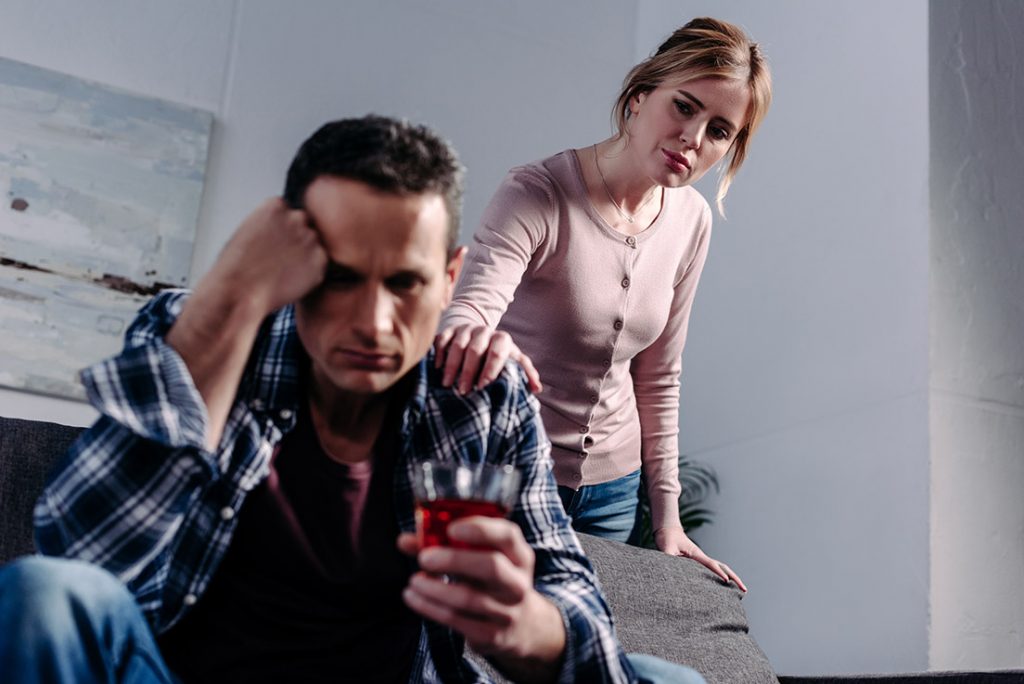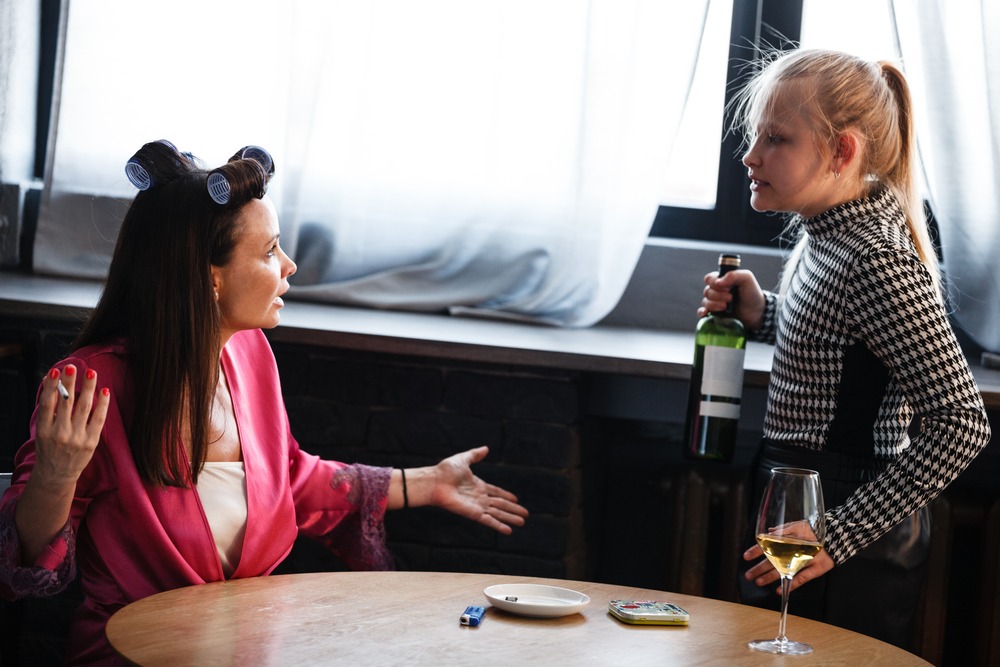Am I married to an alcoholic?

If you are the partner of someone who drinks alcohol excessively, you know from personal experience that it creates more problems than it soothes.
In a relationship with an alcohol dependent person, it is often very difficult to communicate your distress without being shut down or a fight ensuing, which can leave you feeling helpless as to what to do.
Thankfully, we have psychologists and therapists at the Hart Centre who specialise in both couples counselling and overcoming dependency/addictions in relationships, so seeing one of these specialists of ours can help you in the difficult task of bringing up your partner’s alcohol problem, and in addition can help in his/her recovery, and at the same time, help and support you manage your own emotions and get your needs met during this process, as well as help get your relationship back on track.
How common is alcohol dependency or alcoholism in relationships?
Alcohol has a significant role in the everyday Australian’s lives. We are surrounded by it everywhere: social settings, after work events, sport events and family gatherings.
Our recent pandemic dramatically increased alcohol consumption in Australia (Macaulay, RACQP https://www1.racgp.org.au/newsgp/gp-opinion/has-covid-19-changed-australia-s-alcohol-consumpti, 2022). The increase in alcohol consumption in families show that parents increased their drinking by 29%, with as much as 14% drinking alcohol on a daily basis.
It was particularly middle-aged women with children and young adult males who have increased their alcohol intake.
Data from the Australian Bureau of Statistics (https://www.abs.gov.au/statistics/health/health-conditions-and-risks/alcohol-consumption/latest-release, 2022), show that nearly 26% of adult Australians exceeded the Guidelines for Australian Adult Alcohol intake in 2020-21. Australian born individuals were twice as likely to exceed the guidelines as those born overseas. Nearly 20% of people over 18 years consumed more than 10 standard drinks weekly.
How much alcohol is too much alcohol?
For anyone wanting an Internationally credited standardized test to decide whether you or your partner’s alcohol use has become a dependency, use this link to AUDIT – Alcohol Use Disorder Identification Test https://auditscreen.org/check-your-drinking/
Why does alcohol turn from a soothing solution to a dependency problem?
For most people, drinking alcohol is a way to soothe and soften the stresses of life; an innocent, easy and socially acceptable way to self-medicate; a quick solution to ease the problems of the day.
But when a person crosses the line from using alcohol recreationally to getting a feeling that he/she cannot stop even if they want to, or they feel a need to hide their drinking, or find excuses to when it’s ok to have a drink, that is when it has become a dependency problem.
Alcohol dependency is often a family disease. Mostly, we can see the patterns of alcoholism stem back for many generations and it is often interlinked with abuse/neglect in childhood, but not always.
Drinking alcohol is so socially acceptable, that when an individual declines an offer of an alcoholic beverage, some people feel insulted or try to convince the person to have “just one drink”. Many people who actively choose not to drink may experience alienation and feelings of shame. They might notice less frequent invites; they might feel that they are socially isolated to a corner of the party if they do go, and feel the pressure to have an alcoholic drink just to be socially accepted. A person who already struggles with an alcohol dependency condition, might start avoiding social settings for this reason.
Alcohol dependency can be almost impossible to stop for the people involved, but there is help and resources for those who want to save an alcoholic marriage/relationship.
The underlying cause of alcohol dependency
The alcohol dependent is stuck in the initial perception that drinking is soothing his/her problems, and is, in fact, the solution to life’s problems. He/she doesn’t notice the slip into dependency that others around them notice, partly because it can be gradual, but mostly because he/she is in more pain than they realise, and this is their way of calming or covering their pain, feelings of shame and unworthiness, often caused by trauma in their past. The more past trauma, usually the more we need to rely more heavily on things that will relieve it, albeit momentarily.
Alcohol dependency is a progressive condition
Many people think alcoholism equals drink-driving, starting the morning with a vodka, or drinking themselves to unconsciousness. But like with every addiction, it doesn’t start off that way. There are levels of dependence before the disease takes over, and there are different patterns of drinking that manifests differently. Some may only drink occasionally but have a problem stopping once they start, others need to end each day with a few drinks, which can escalate to more than a few.
Some might start off with beers or wine and escalate into heavier spirits as the disease progresses. Some might have co-morbid addictions such as gambling, drugs or sex addictions. The individual can quickly go from where they still have a choice to stop, to addict, where they feel uncapable to stop on their own.
It’s usually a problem for the partner well before it is for the drinker
Alcohol dependency becomes a problem when it takes over the daily life of an individual, where they are no longer functioning and it impacts their loved ones, both emotionally, but also where family or friends are expected to do things for the alcoholic.
8 signs that you have alcoholism in your relationship
1. Everything revolves around alcohol
One big sign from early in the relationship is that alcohol has a central role in any setting. From the first date to movie nights, after-beach sessions, football games, BBQ’s, camp trips, or even just after work, your partner seems like he/she always needs alcohol present, and often romanticise alcohol as a “need” or a reward they deserve after a long week.
2. Excuses and more excuses
Once you start noticing this excessive need for an alcoholic beverage, you start questioning: “Do you really need a beer right now? Haven’t you had enough wine? Do you really need a whiskey for the road?” The answer you have heard so often echoing back: “One more wouldn’t hurt”, “I’ve only had a couple”, “Geez you’re a nag”, “I’m not even tipsy”, “What about yourself, you got blasted last weekend”. The excuses increase with time, and the partner with alcohol issues might even start hiding bottles, not telling you if they’ve been drinking, or telling you they had less than they did.
3. You feel cheated on – “I’m always second”
Living in an alcoholic marriage/relationship is lonely. When the alcoholic spouse reaches a point where drinking is no longer connected to socialising, they prefer to drink in solitude and might even avoid drinking in public altogether, you might feel that the person you fell in love with is unreachable. You constantly feel that you come second to the drink, and there is nothing you say or do that will stop their destructive behaviour. These feelings could be similar to those experienced when your partner is unfaithful. The alienation is unbearable. Sometimes you get glimpses of the person you once knew, only to see them soon again fall into their solitude.
4. You find yourself lying to friends and family
Outwards, life looks perfect: you have the home of your dreams: the cars, the jobs (yes, a lot of alcoholics manage to hide their problem for a very long time and manages to upkeep employment successfully), the beautiful kids, and even the holidays. You are not just lying to friends or family; you are also lying to yourself and your spouse. While problems pile up under the rug, you keep your head higher, smile harder and work more to show the world how fantastic your life is. Outwards, you might look like a super-couple, and you both hold up that façade at social gatherings. Deep down you know a lot of these things aren’t true, even how much you would like them to be. You become a compulsory liar, and the ultimate disguise for your partner’s drinking problem. You have fallen into the role as an enabler.
5. You feel like you do everything
Behind closed doors you are the-everything. You look after finances, plan holidays, kids’ activities, appointments, weekend happenings. On top of holding up a job you also cook, clean, do laundry, and everything revolving the kids. The lonely relationship continues down the rabbit hole. The life you hoped to build with the person of your dreams lives behind an empty shell.
6. Parenting your partner
Increasingly, you feel that you need to micromanage everyone around you. You feel that the world will end if you stop doing for your partner what he/she could do for themselves. Eventually, you can start to feel like you are your partner’s parent, not their spouse. The knit-picking can be unbearable, but you don’t know how to stop.
7. The Jekyll and Hyde syndrome
Dr Jekyll and Mr Hyde was a story by Robert Louis Stevenson about Dr Jekyll, a successful scientist who was liked by everyone, extremely intelligent and well-respected in society. At night-time he would turn into a very dangerous and murderous criminal, Mr Hyde.
The reference to this story has been used by many people to explain a behaviour, often found in addicts and individuals with narcissistic behaviours or other personality disorders or tendencies.
The syndrome is likened in a behaviour where the individual seems to have two very distinct personalities, often an alter-ego, or a façade that they wish to display outwards to everyone they know, to hide their true shameful self.
Why do I feel like I’m going crazy?
As a partner to a “Jekyll and Hyde” person, you might feel increasingly confused and crazy. Your partner might say awful things to you under the influence of alcohol, or even be abusive (verbally, emotionally, or physically), be grandiose or gaslight you (change the truth of the past), to be loving, caring and apologetic the next day. They might promise to never drink again, and you see glimpses again of the partner you fell in love with. This Jekyll and Hyde syndrome makes you confused, and sometimes feeling like you are going crazy.
8. The Merry-go-round of denial
This brings us to the Merry-go-round of denial (read the full meaning of it here: https://www.drugfam.co.uk/wp-content/uploads/2021/05/A-Merry-Go-Round-Named-Denial-2021.pdf) .
The non-alcoholic partner has entered a never-ending dance with their alcoholic spouse. This is a trip that is extremely difficult to end. The Merry-go-round is like a three-act-play that never ends, where the alcoholic always ends up drinking in the third act, before we start again in act 1. The alcoholic spouse will only have the ability to end the play if all players involved stop the act and steps off the Merry-go-round altogether.
Why can’t your partner just stop drinking alcohol?
Most active alcoholics don’t see the drinking as a problem, therefore overcoming denial is the number one step towards recovery. The partner often feels anger and resentment towards their spouse and that they are choosing the drink before them, but the problem is so much deeper than that.
Recovery won’t happen until both partners see and understand the dance of the alcoholic dependent, and that both partners are contributing as they are dancing.
The dynamics of an alcoholic relationship lay in both partners: one that is hiding from feelings of shame and guilt by numbing the pain with alcohol, and the other over-functioning and often unwittingly imposing further shame and guilt onto the partner by continually highlighting the problem. The non-alcoholic partner can become controlling and unrecognisable to themselves.
At this stage, it can be a downward worsening spiral if you don’t reach out for professional help.
What if I am the one who can’t stop drinking alcohol?
Recognising that you have a drinking problem is the first step to recovery. It is a brave and important step to take, and there is a lot of help to receive. Talk to your partner and explain how you feel. Quitting alcohol is very difficult to do on your own. Whether or not you are alcohol dependent, or have developed alcoholic syndrome/alcoholism, quitting cold turkey exposes the wound and could be very painful for all parts involved. You will need supports in place.
Relationship Counselling when one spouse has an alcohol problem
At the Hart Centre, we have psychologists and therapists who are specialists in BOTH addictions/dependencies and couples counselling. Seeing one of these specialists helps you address the very difficult job of raising the alcohol dependency as a major problem in your relationship, and also gives both your partner support in getting to the root of the problem, as well as you support in getting your needs met without activating your partner, and then, additionally, a chance to then work on improving your relationship.
See at the end of this blog for our Therapists who have both Specialisations.
Doing what you can towards recovery
As a spouse of an actively drinking alcohol dependent partner, you can affect many aspects of this dynamic you unwittingly find yourself in with your partner. Here are a few suggestions…
1. Stop being an enabler.
The first step towards helping an alcoholic to recovery is to step off the merry-go-round. Stop enabling the unwanted behaviour, set up strong boundaries, for example, that you no longer will buy alcohol and that you no longer will cover up their habits to family and friends.
2. Let go of being responsible for and trying to control his behaviour.
You can’t control people, places, and things. All you can ever have control over is yourself and your own behaviours. This is more difficult than it sounds. Just stop criticising, commenting, being sarcastic, passive-aggression, stonewalling. Lose the focus on him and make it about you.
3. Focus on your own wellbeing.
Take all that energy that was monitoring and taking responsibility for him and focus on what you need, and what makes you happy in your life.
4. Find humility and compassion.
This is very difficult indeed. Just remember to look at alcohol dependence as a progressive brain condition similar to Alzheimers. The alcoholic struggles to change and already hates themself more than anyone else does. Your resentment and anger only add to the shame they are already experiencing. Try to find humility and compassion for your spouse again (without enabling or taking responsibility for them). This takes a lot of practice.
Why there is nothing you can do to make the alcoholic stop drinking
A person with an alcohol problem will only have the capacity to realise the magnitude of their problem once they experience enough negative consequences to themselves, and the potential of losing their relationship if they don’t stop is often what does it. They need to hit rock bottom and see what they will lose if they continue their behaviours. You can save your marriage by stop trying to save the alcoholic.




